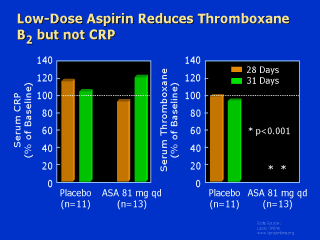 |
In a prospective
study of healthy volunteers, high-sensitivity CRP (hs-CRP) and serum
platelet-cyclo-oxygenase-1–derived thromboxane B2 were studied in 57 men and
women randomized to placebo or to aspirin 81 g/d, 325 g every third day, 81 g every third
day, or 40 g every third day for 31 days. Compared with placebo, day-28 and -31 serum
thromboxane B2 concentrations were reduced by 100%, 90%, 84%, and 78% in the
respective aspirin treatment groups (p<0.001 vs. baseline in each active treatment
group). On day 45, 14 days after discontinuation of treatment, serum thromboxane B2
concentration returned to baseline levels. In contrast, CRP levels did not change
significantly from baseline in any treatment group. Body mass index (BMI) was the only
independent predictor of day-31 CRP level. Reference:
Feldman M, Jialal I, Devaraj S, Cryer B. Effects of low-dose aspirin on serum C-reactive
protein and thromboxane B2 concentrations: a placebo-controlled study using a
highly sensitive C-reactive protein assay. J Am Coll Cardiol 2001;37:2036-2041.
Web
site |
